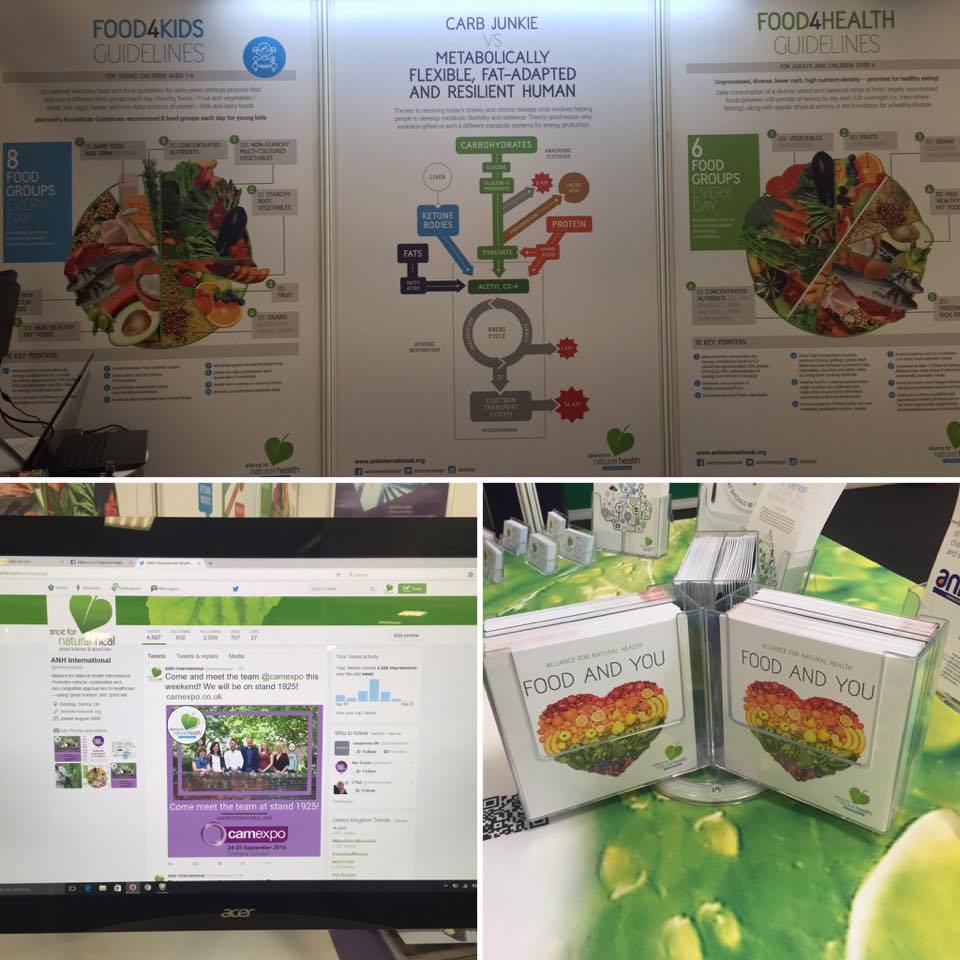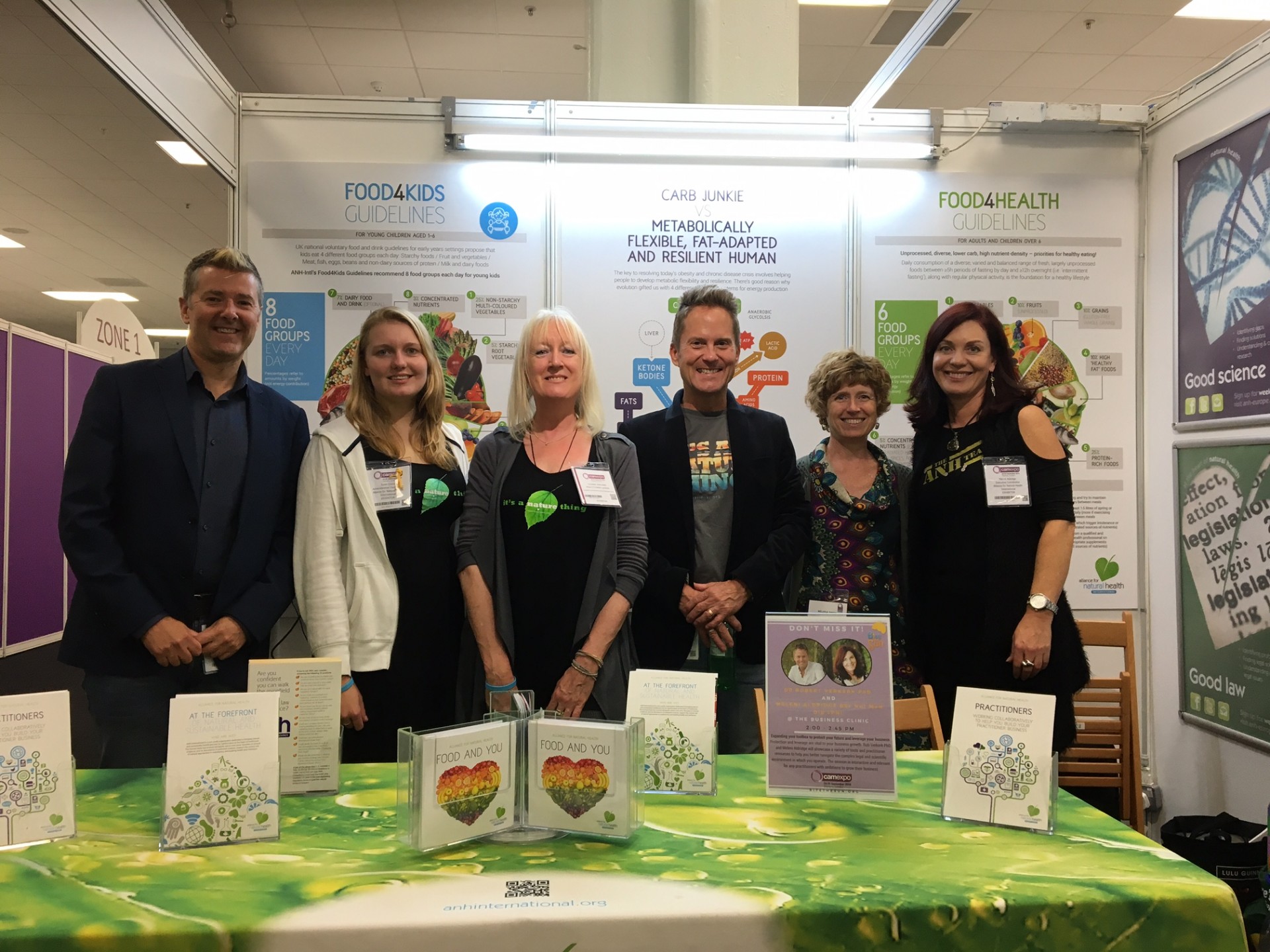Last weekend saw this year’s CAMexpo at Olympia in London — the premier UK show for practitioners of all complementary and alternative medicine (CAM) modalities. We used the opportunity to launch our newly redesigned Food4Health Guidelines for adults and children. Alongside the Guideline ‘plates’ is our brand new “Food and You” pocket guide (available hard copy; please email us for orders) aimed to inspire people to select ‘rainbow foods’ when they’re out shopping and help more people to eat a wide and varied, healthful diet. We’ve also redesigned our Food4Kids guidelines — as it’s so important that kids start out right, especially given that we know diet and lifestyle behavioural patterns are so firmly established in childhood.
New members of the ANH-Intl team, Mark Killick (Technical & Strategic Relations Manager) and Melissa Smith (Outreach & Communications Officer) took the opportunity to network across the natural health community, as well as catching up with existing contacts.

During the weekend event, Rob Verkerk PhD gave two presentations in the Nutrition Theatre:
1) How baseline and ongoing assessments can transform your practice, whatever your modality
In this presentation, Dr Verkerk considered the purpose and goals of assessing patients; the type of assessment used i.e. structured vs unstructured; how to optimise the therapeutic relationship and the use of physical examinations/functional assessments, that also address mental and emotional health issues. He posed the question of whether practitioners could or should consider the use of an online dashboard for monitoring progress and demonstrated a possible model.
It may seem obvious that the most important question to ask a patient is “how do you feel?” before asking more detailed questions, but it’s a question often overlooked, especially in a mainstream primary care setting where time is very limited.
The reality is that time spent with the client in a consultation is always going to be far less than the time the client spends away from the practitioner. Given this, practitioners should consider the following:
- What’s the least you need to do at each client consultation?
- What can your client do to monitor progress?
- How frequently can they monitor appropriate aspects?
Dr Verkerk stressed that an individual effectively responds to his/her personal 'healthcare system', that is a composite of interventions mediated or guided by one or more practitioners as well as self-care (guided or unguided) This could include dietary or lifestyle changes, use of food supplements, more ‘me-time’, mindfulness activity, being in nature, social interaction and a many other possible effects.
The patient experiences the composite of all these factors, and it should be incumbent on any perceptive practitioner to record and monitor the effect of these multi-factorial effects on health and resilience.
Download PDF of presentation slides.
2) Fast-tracking homeostasis with food, physical activity and complex multi-nutrient nutritional formulas
In this presentation Dr Verkerk helped practitioners to find a language that would assist in communicating the multi-factorial interventions to clients or patients. He emphasised that the body is always trying to restore balance, while sometimes, especially when exposed to excessive stress (physiological, chemical, emotional, etc), this process is compromised.
The body is an extremely complex interconnected system, so if one system is underperforming it will affect others. Most chronic disease is caused by one or more of the following areas of dysfunction: mitochondria; digestive/immune system; oxidative stress; persistent low grade inflammation; imbalanced neurotransmitter biochemistry.
The first line of support should be through food (which may include supplements) first, followed by physical activity and then rest. As human beings, we have successfully evolved because we are made to be metabolically flexible, fat-adapted and resilient beings. It therefore stands to reason that we should eat in ways that optimise metabolic flexibility through our food choices, food frequency and portion sizes.
Download PDF of presentation slides.

Business Clinic
Rob Verkerk and Meleni Aldridge, ANH-Intl’s executive coordinator, and a practitioner herself, presented in the Business Clinic on the topic of 'Expanding your toolbox to protect your future and leverage your business'. They discussed the resources and tools available to practitioners via ANH-Intl to help leverage time whilst maximising profitability. Resources include science; regulatory advice; education; client facing tools and a closed practitioner only Facebook Group. The ANH-International website is a large repository of 15 years of information, including weekly articles based on latest research; healthy eating guidelines (for adults and children); factsheets; handouts and posters — all of which are free to download.
Individual practitioners, companies facing regulatory challenges, or those simply wanting support navigating the complex minefield of laws affecting clinical practice, the availability of products or marketing of services, can find support through ANH's consultancy arm (ANH Consultancy).
A unique practitioner resource, Bite the Sun, has been created by practitioners for both the public and practitioners. BTS has been built around 3 Rays of Health; food and nutrition; activity and movement and rest, sleep hygiene and piece of mind. There is also a dedicated children’s area, which is fun and interactive. This resource has been created to help practitioners manage the demands on them so their earnings cover their time and their time is utilised more effectively.
Panel debate: ageing population
On Saturday afternoon, an expert panel debate on one of the classic 'elephant in the room' issues was helped. Joining Rob Verkerk PhD on the panel were Marilyn Glenville PhD, of Glenville Nutrition, Margaret Coates, chief executive of the Complementary and Natural Healthcare Council (CNHC), and Tracey Smith of the Association of Reflexologists. Against a backdrop of the UK’s elderly population increasing by 65% in the next 20 years, the panel were asked to debate ‘Caring for an aging population’.
Many more people are living into old age with chronic disease. The ‘pill for an ill culture’ is failing miserably, often resulting in a cocktail of drugs which is often not monitored or re-assessed and then causing side effects to further complicate the picture of symptoms. The panel delivered their views on how CAM practitioners can help the aging population, add more life in their years rather than just more years in their lives.
Dr Verkerk offered that complex diseases require complex solutions and felt that a multi-modality approach was the best way forward in preventing and treating disease, given the different body systems and their functionalities are inextricably linked.
The panel agreed that caring appropriately for an aging population is dependent on the mainstream healthcare service recognising the benefits of complementary and alternative adjunct therapies. The CNHC has an important role to play in explaining to the NHS how different modalities can be beneficial to supporting and optimising health. Whilst they are breaking down barriers, they in turn require CAM practitioners to target the clinical commission groups along with GP’s to ask, “Why shouldn’t people get access to funded complimentary therapies?”
The workshops and seminars highlighted ANH International’s campaign for a sustainable healthcare system, whereby all the different modalities of complementary and alternative health should be integrated into the current health system, in the UK and beyond.
There was consensus from among all panelists that among the greatest challenges are an over-reliance on pharmaceuticals, failure to instill healthy dietary and lifestyle patterns sufficiently early and a need to engage people more directly in the management of their health, in the process making them less reliant on being managed by their primary care physician or general practitioner.
Back to Food4Health campaign page








Comments
your voice counts
29 September 2016 at 10:27 am
As regards my own health, I do not take any notice of any government health warnings. They have been wrong so many times I look out for myself and my wife, reading up on good and bad things to eat plus the fact I keep as far away from anything with GMO involved as I can, this includes non organic rapeseed oil and wheat.
My GP tried to put me on cholesterol tablets a few years ago when the figure they came up with was 5.3, I told her,(in a nice way), what to do with them.
A true saying though, you are what you eat and I stick by that.
Your voice counts
We welcome your comments and are very interested in your point of view, but we ask that you keep them relevant to the article, that they be civil and without commercial links. All comments are moderated prior to being published. We reserve the right to edit or not publish comments that we consider abusive or offensive.
There is extra content here from a third party provider. You will be unable to see this content unless you agree to allow Content Cookies. Cookie Preferences